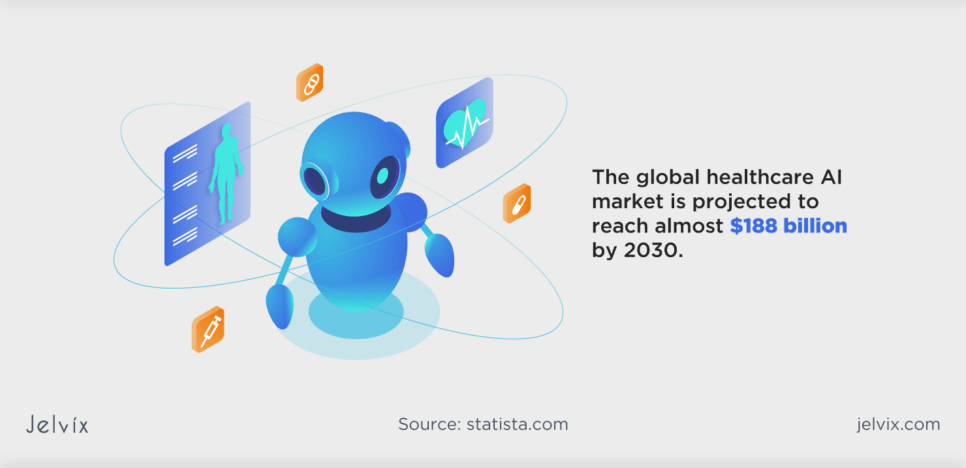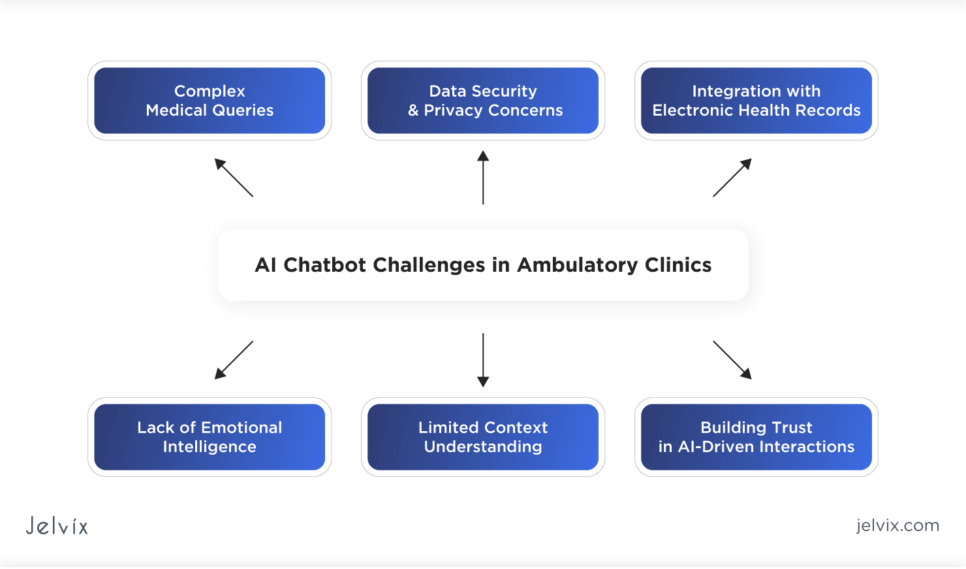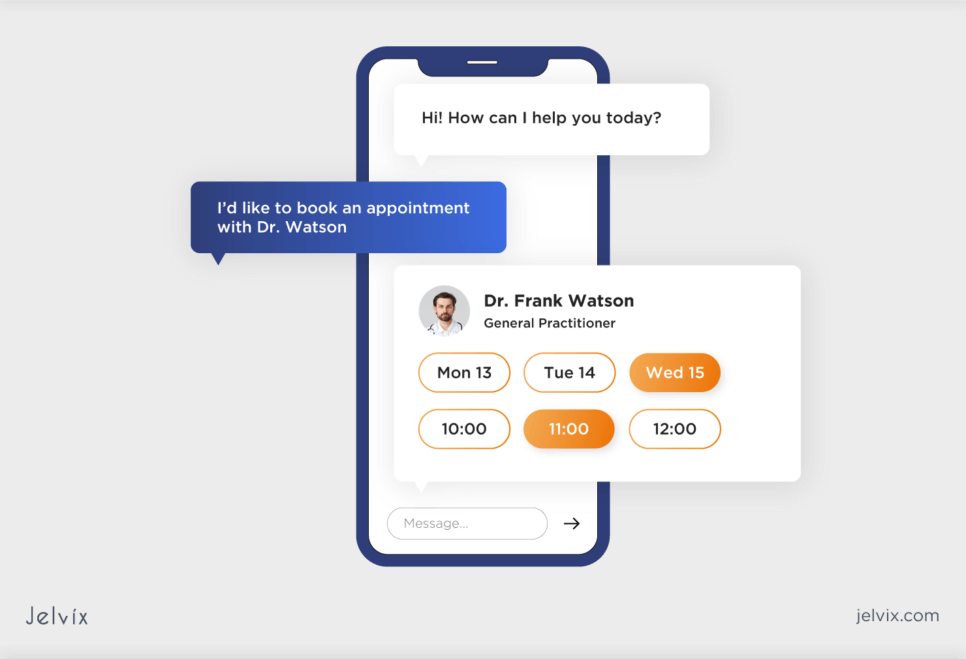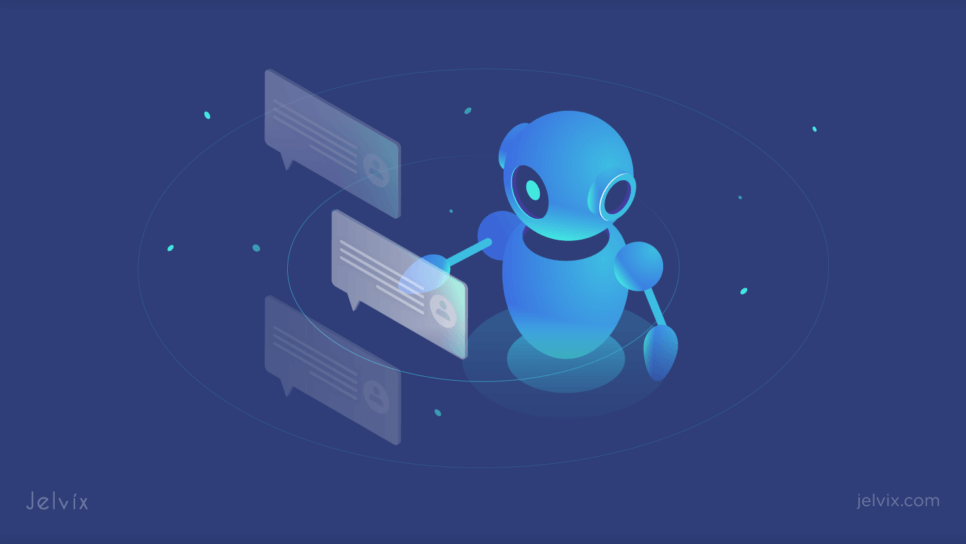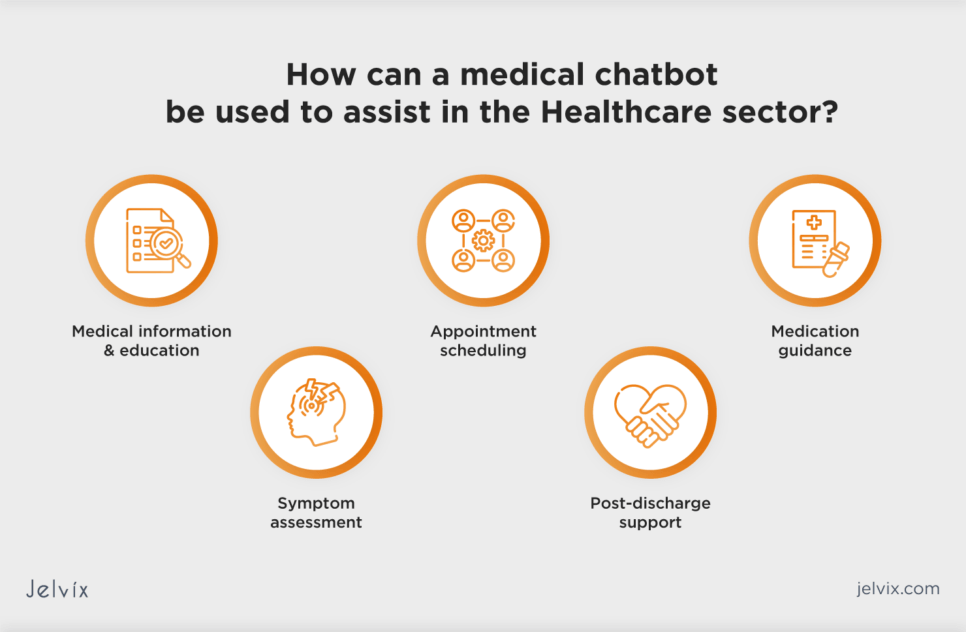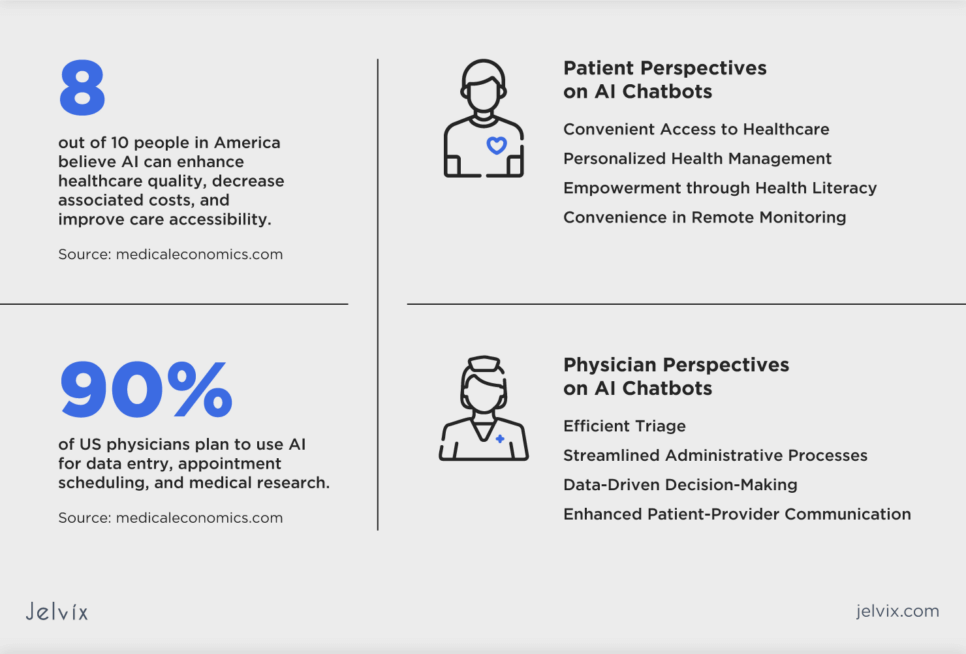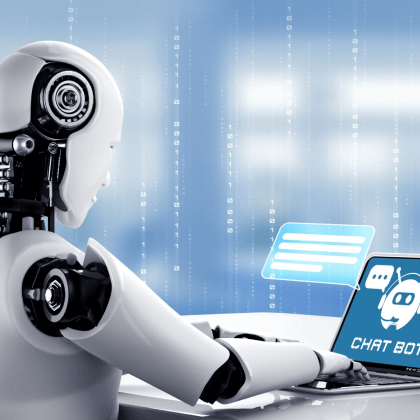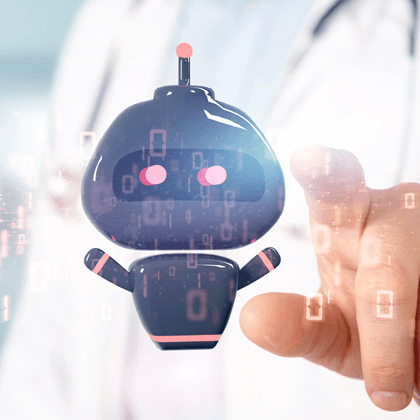In recent years, the integration of artificial intelligence into healthcare settings has marked a paradigm shift in patient engagement and healthcare operations. Projections indicate that the global healthcare AI market is poised to reach nearly 188 billion U.S. dollars by 2030.
As we step into 2024, AI-driven chatbots promise to leverage healthcare. However, chatbot training, maintenance costs, and performance issues remain major challenges for healthcare providers.
If you want to know how to properly integrate an AI chatbot in your healthcare ecosystem, keep reading. In this article, the Jelvix team covers the benefits, challenges, and use cases of chatbot implementation to help you make an informed decision for your business.
Reasons to Use AI Chatbots in Ambulatory Care Clinics
AI chatbots have emerged as valuable tools that contribute to the overall efficiency of healthcare operations.
Efficient Appointment Scheduling
AI chatbots facilitate appointment scheduling, allowing patients to book, reschedule, or cancel appointments at any time. A hospital appointment chatbot is capable of improving patient accessibility and reducing the workload on administrative staff.
Symptom Triage and Preliminary Guidance
An AI chatbot can serve as a physician’s tool that helps evaluate a patient’s condition. Using machine learning algorithms, chatbots can assess the reported symptoms and provide preliminary guidance. This aids in triaging patients based on the urgency of their needs, helping clinics allocate resources efficiently. It’s important to note that chatbot recommendations must be verified by a doctor, as AI supports the doctor’s decisions rather than replaces them.
Timely Patient Education
Chatbots deliver personalized healthcare information to patients, educating them about their conditions, treatment plans, and post-care instructions. This ensures that patients are well-informed and actively involved in their healthcare process.
Enhanced Operational Efficiency
Automation of routine tasks, such as appointment reminders and administrative queries, frees up staff to focus on more complex aspects of patient care. This boosts overall operational efficiency and allows healthcare professionals to dedicate more time to patient interactions.
Engagement and Follow-up
AI chatbots engage patients beyond the clinic visit. They can send post-appointment follow-ups, medication reminders, and wellness tips, fostering ongoing patient engagement. This continuity of care contributes to better health outcomes and patient satisfaction.
AI Chatbots in Ambulatory Clinics: Limitations and Challenges
Integrating AI chatbots into ambulatory care clinics transforms patient interactions, making them more efficient, personalized, and supportive throughout the entire care journey. However, such integration requires knowledge and resources. It’s crucial to address the limitations and challenges associated with AI chatbots in ambulatory care settings to conduct a successful implementation.
Data Security and Privacy Concerns
The exchange of sensitive health information raises concerns about data security and privacy. Ensuring compliance with healthcare regulations, such as HIPAA, is crucial to prevent unauthorized access and protect patient confidentiality.
Think about Implementing end-to-end encryption, secure authentication, and access controls to safeguard patient information and prevent potential security breaches.
Integration with Electronic Health Records
Seamless integration with EHR systems is essential for comprehensive patient care. However, achieving interoperability between AI chatbots and diverse EHR platforms can be technically challenging, leading to fragmented healthcare data.
To handle this challenge, collaborate with EHR providers for custom solutions. Ensure that the chatbot can access and update relevant patient data securely, fostering a cohesive healthcare information environment that benefits both patients and healthcare providers.
If you would like to learn more about the possibilities of tailored healthcare solutions, feel free to contact Jelvix’s managers.
Complex Medical Queries
Handling intricate medical queries that require in-depth knowledge and analysis poses a challenge. While chatbots can provide general information, they might struggle with complex medical scenarios that demand the expertise of healthcare professionals.
Facilitate continuous learning for AI chatbots by regularly updating their medical knowledge base. Integrate a chatbot with reputable medical databases, research updates, and training datasets to enhance its ability to handle complex medical queries.
Lack of Emotional Intelligence
AI chatbots may struggle to interpret and respond appropriately to nuanced emotions expressed by patients. The absence of emotional intelligence could impact the quality of patient interactions, especially in sensitive situations.
If you want to get the most out of chatbots for health, consider investing in AI algorithms that enhance emotional intelligence. This will enable chatbots to recognize and respond to a broader spectrum of emotions. Also, incorporate natural language processing techniques to better understand the context and sentiment.
Limited Context Understanding
AI chatbots may face challenges in understanding the broader context of a patient’s healthcare process. Limited context awareness might result in responses that are not fully tailored to individual patient needs.
Implement context-aware algorithms that consider the patient’s medical history, ongoing treatment plans, and previous interactions to provide more personalized and accurate responses.
Adoption and Trust
Building trust in AI-driven interactions can be challenging. Healthcare professionals may be hesitant to embrace chatbot assistance due to concerns about accuracy, reliability, and the potential for misinterpretation of information.
Consider involving physicians in the development and monitoring of AI chatbot interactions. Assemble teams that collaborate on refining algorithms, validating responses, and ensuring alignment with medical standards.
Common Strategies for AI Chatbot Training
An AI chatbot in healthcare is a complicated tool that requires training, just like a human specialist. This involves using a combination of data-driven approaches and iterative refinement. Here are some of the effective ways to train healthcare chatbots and help them gather relevant healthcare information:
- Data structuring: annotate large datasets with labeled examples of user queries and appropriate responses. Consider collaborating with healthcare experts to ensure accurate annotations that reflect diverse medical scenarios;
- User interactions: enable the chatbot to learn from real-time user interactions and queries. Implement feedback loops to adapt and improve the chatbot’s responses. Also, incorporate mechanisms for users to provide feedback on chatbot replies;
- Scenario-based training: develop scenarios representing various medical conditions and healthcare inquiries. Train the chatbot on diverse scenarios to ensure versatility in handling patient queries;
- Contextual awareness: train the chatbot to understand and retain context during conversations. Implement memory mechanisms to recall previous user inputs and tailor responses accordingly;
- Emotion recognition: implement emotion recognition capabilities in the chatbot to identify and respond to the emotional cues of users. This enhances the chatbot’s ability to provide empathetic and personalized responses, especially in healthcare scenarios where emotional support is crucial;
- Regular updates: keep the chatbot up-to-date with the latest medical information and guidelines. Schedule regular updates to incorporate new data and ensure its knowledge remains actual.
Note that for a better training outcome, the Jelvix team recommends combining various techniques.
Addressing Patient Inquiries with ChatGPT
As a Large Language Model, ChatGPT can help address patient inquiries. However, this process involves careful preparation and customization. We recommend that you pay attention to these tips for the efficient use of medical GPT:
- Medical information and education: ChatGPT can be programmed to provide reliable and up-to-date medical information to patients. It can answer questions about symptoms, conditions, treatment options, medications, and general health education;
- Appointment scheduling: integrating ChatGPT into healthcare systems can enable patients to schedule appointments, receive reminders, and inquire about the availability of healthcare services;
- Medication guidance: ChatGPT can provide patients with information about commonly recommended medications, including dosage, side effects, and potential interactions. However, the chatbot should encourage patients to consult with a physician for precise information on medication usage;
- Symptom assessment: ChatGPT can assist in the initial assessment of symptoms, asking relevant follow-up questions to understand the nature and severity of the issue. Based on the information provided, ChatGPT should encourage a patient to contact a physician for a comprehensive symptom evaluation and personalized medical advice;
- Post-discharge support: after hospital discharge, patients may have questions about post-treatment care, recovery, and potential warning signs. ChatGPT can serve as an assistant who accepts patient requests 24/7 and reminds about doctor’s recommendations.
Although ChatGPT can be helpful with patient inquiries, healthcare pros need to note that it may struggle with accurately interpreting nuanced medical queries. This may lead to potential misunderstandings or providing incorrect information.
Curious about achieving interoperability in your ambulatory clinic? Discover a practical guide for improving interoperability in healthcare .
Healthcare Chatbot Use Cases That Are Worth Talking About
Healthcare chatbots have become invaluable tools in transforming the delivery of healthcare services. The examples below showcase top health chatbots that assist patients in everything, from symptom check-ups to mental health support.
Symptom Checker
Babylon Health, a UK-based telehealth company, offers a chatbot-driven symptom checker that employs AI algorithms to assess the information and provide potential diagnoses. This tool assists users in understanding their health conditions, directing them to appropriate resources, and helping to find a doctor that suits their current condition the most.
Mental Health Support
Woebot, developed by psychologists at Stanford University, is an AI-powered chatbot designed to provide mental health support. It engages users in conversations, offers therapeutic interventions based on cognitive-behavioral therapy, and monitors users’ moods. It can also send the received data to a physician to help diagnose potential mental health issues on time. Woebot has demonstrated effectiveness in providing accessible mental health support and improving users’ emotional well-being.
AI-Powered Triage
Buoy Health’s chatbot utilizes AI to triage and guide users through their symptoms. Users describe their conditions, and the chatbot, through a series of questions, narrows down potential causes. It then offers advice on whether to seek medical attention, manage symptoms at home, or consult with a healthcare professional. What’s more, the chatbot can automatically send a patient’s health data to a physician.
Virtual Consultations
HealthTap offers virtual consultations through its chatbot platform. Users can connect with healthcare professionals, describe their symptoms, and receive advice or prescriptions without the need for in-person visits. This not only enhances accessibility to healthcare services but also reduces the burden on traditional healthcare facilities.
Personal Health Companion
Ada is a chatbot designed to be a personal health partner. Users can interact with Ada to assess symptoms, receive information about potential health conditions, and access personalized health insights. Ada’s conversational interface makes health information more accessible and helps users proactively manage their well-being.
Best Strategies to Optimize AI Chatbot Maintenance
AI chatbot maintenance is crucial to ensure optimal performance, user satisfaction, and ethical use in healthcare settings. Here are key considerations for effective AI chatbot maintenance:
- Regular updates: schedule regular updates to keep the chatbot’s knowledge base, algorithms, and responses up-to-date incorporating the latest medical information, treatment guidelines, and regulatory changes;
- Performance monitoring: implement monitoring systems to track the chatbot’s performance. Analyze user interactions, identify common issues, and use analytics to enhance the chatbot’s capabilities;
- Security measures: prioritize cybersecurity by regularly updating security protocols. This includes encryption methods, secure data storage, and authentication processes to safeguard patient information;
- Content quality assurance: establish content quality assurance procedures to ensure accurate and reliable information. Incorporate natural language processing and machine learning algorithms to identify and fix any inaccuracies in the chatbot’s responses;
- User feedback: incorporate user feedback mechanisms to gather insights into the AI chatbot’s performance. Use feedback to identify areas for improvement, address user concerns, and enhance the overall user experience;
- Ethical guidelines: regularly review and update the chatbot’s responses to align with ethical guidelines and healthcare regulations. Ensure that the chatbot provides information ethically, respects user privacy, and avoids inappropriate responses;
- Cross-platform compatibility: ensure that the chatbot remains compatible with various communication channels and devices. Regularly test its performance across different platforms to guarantee a seamless user experience;
- Scalability planning: consider scalability in maintenance planning. As user interactions increase, plan for scalable solutions to handle higher loads, ensuring that the chatbot remains responsive and efficient.
5 Ambulatory Clinics That Use Chatbots in Their Medical Operations
Real-world examples provide insights into the practical implementation of AI chatbots in ambulatory care clinics. By researching healthcare organizations that already use AI chatbots in their practice, you can assess the effectiveness of these chatbots, as well as evaluate their advantages and drawbacks.
Mayo Clinic
Mayo is a US-based clinic that utilizes a voice-powered chatbot to assist patients with appointment scheduling, basic health inquiries, and medication information. The chatbot’s effectiveness is notable in providing quick responses and improving appointment management.
Pros:
- Offers quick and accessible information for first-aid situations;
- Assists users in understanding initial steps for various health emergencies;
- A convenient tool for immediate assistance before seeking professional medical help.
Cons:
- Has limited scope to address more complex or specific medical inquiries;
- Cannot replace professional medical advice for serious conditions.
NHS 111
The National Health Service’s non-emergency helpline in the UK uses a chatbot designed to provide information on symptoms and guide users to appropriate healthcare services. It effectively triages urgent and common cases, helping users make informed decisions.
Pros:
- Efficient triaging and directing users to appropriate healthcare services;
- 24/7 accessibility for non-emergency medical inquiries;
- Swift responses to user queries.
Cons:
- Cannot fully replace the need for human interaction in complex cases;
- Limited in providing a holistic understanding of individual patient history.
Cedars-Sinai
Cedars-Sinai, a major medical center in the US, uses an AI chatbot for pre-appointment screenings. The chatbot answers patient queries and provides information about available healthcare services.
Pros:
- Streamlined pre-appointment processes and screenings;
- Quick access to general healthcare information;
- Improved patient engagement and communication.
Cons:
- Challenges in addressing nuanced medical concerns;
- May not replace the need for direct communication with healthcare providers in certain situations.
Cleveland Clinic
The Cleveland Clinic has introduced a chatbot designed to function as a screening tool for patients. Accessible on various sections of the website, including the main page, the chatbot guides users through a series of questions to assess their symptoms and provide recommendations on whether they should manage their symptoms at home or seek medical care.
Pros:
- Improved patient navigation within the healthcare system;
- Efficient appointment scheduling and reminders;
- Enhanced accessibility for routine inquiries.
Cons:
- Limited ability to handle complex medical scenarios;
- User reliance on the accuracy of the provided information.
Kaiser Permanente
Kaiser Permanente, based in Oakland, California, has implemented an AI-based chatbot program to assist patients in navigating their care. The program, initiated in 2022 and fully rolled out to Kaiser members in March, allows patients to send a text to the chatbot and communicate regarding their medical concerns in real-time.
Pros:
- Enables patients to easily communicate about their medical problems through text;
- Utilizes follow-up questions;
- Provides suggestions on potential conditions.
Cons:
- Does not replace the interaction between patients and physicians;
- Primarily focuses on performing clerical work rather than advising on health conditions.
As can be seen from the examples described above, chatbots require careful consideration and thoughtful implementation to maximize their effectiveness. What’s more, their effectiveness can evolve as technology advances, so you need to consider scalability when implementing AI chatbots into your healthcare environment.
The Future of Chatbots in Healthcare: Patient and Doctor Perspectives on AI
The future of chatbots in healthcare holds significant promise, shaping the patient and doctor perspectives on AI in transformative ways. Understanding the perspectives of both patients and healthcare professionals is crucial for a successful integration of AI chatbots.
Patient Perspectives on AI Chatbots
The potential of AI, including chatbots, is recognized by the average patient. According to a survey, 8 out of 10 people in America believe that AI has the capacity to enhance healthcare quality, decrease associated costs, and improve care accessibility.
Convenient Access to Healthcare
Patients increasingly value the convenience of accessing healthcare services. AI-driven chatbots provide instant, 24/7 access to information, symptom checking, and basic health advice. As a result, patients can quickly address health concerns, receive preliminary guidance, and decide on the next steps from the comfort of their homes.
Personalized Health Management
Chatbots have evolved to offer highly personalized health management solutions. They consider individual health data, preferences, and behaviors to provide tailored advice, preventive measures, and lifestyle recommendations. In other words, AI’s ability to analyze individual health data allows for finding an appropriate doctor for the patient and the creation of personalized care plans.
Empowerment through Health Literacy
AI chatbots play a key role in health education, offering users clear information about medical conditions, treatment options, and wellness practices. Patients may become more health-literate, resulting in making informed decisions about their well-being.
Convenience in Remote Monitoring
The use of AI for remote monitoring is seen as convenient, especially for people with disabilities. Patients appreciate the ability of AI-driven systems to continuously monitor their health through wearables and other devices, providing a proactive approach to healthcare management.
Physician Perspectives on AI Chatbots
Healthcare experts anticipate that AI automation will enhance efficiency, reduce costs, and improve accessibility to patient care. 90% of US physicians plan to use AI for data entry, appointment scheduling, and medical research.
Efficient Triage
AI supports doctors in efficient triage and resource optimization. Chatbots and AI algorithms assist in prioritizing patient cases based on the severity of symptoms, enabling healthcare professionals to allocate resources effectively.
Streamlined Administrative Processes
AI automates administrative tasks, streamlining workflows for healthcare providers. This allows doctors to spend more time on direct patient care and complex medical cases instead of being burdened with manual tasks such as appointment scheduling and paperwork.
Data-Driven Decision-Making
AI contributes to data-driven decision-making in healthcare. Doctors value AI systems that provide insights derived from large datasets, aiding in clinical decision-making, treatment planning, and the identification of trends in patient behavior.
Enhanced Patient-Provider Communication
AI facilitates communication between patients and healthcare providers. Chatbots serve as communication channels, allowing for secure messaging, automated check-ins, follow-ups, and the exchange of health-related information, fostering stronger patient-provider relationships.
Jelvix’s Expertise in Custom Healthcare Solutions
As technology continues to advance, the collaboration between AI and healthcare professionals is set to redefine the future of ambulatory care. At Jelvix, we recognize the influence that healthcare tech solutions wield over patient care. That is why we approach our role as an experienced tech partner in this domain with the utmost seriousness.
We acknowledge that AI chatbots aren’t perfect yet. We believe a good healthcare solution must not only demonstrate advanced technical abilities but also adhere to the highest standards of data security and patient privacy.
If AI inspires you the way it sparks inspiration in us, feel free to reach out to our managers. They will assist you with any questions you may have about custom AI-driven solutions.


